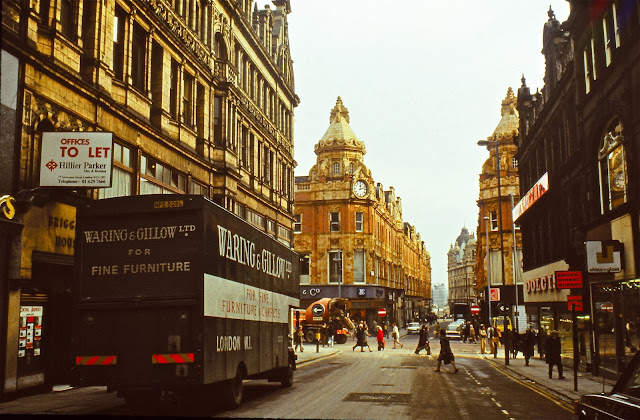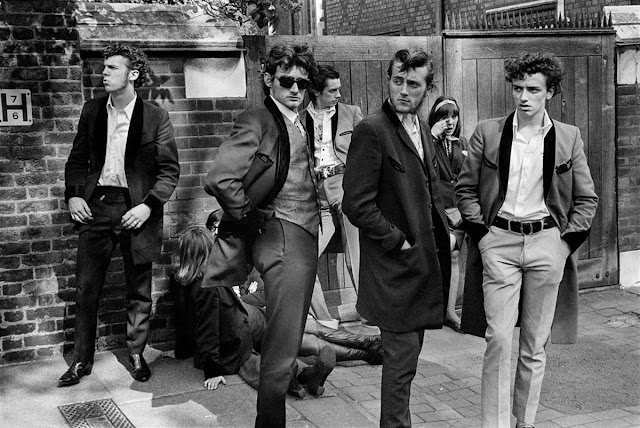World War II had a huge impact on the daily lives of the people of Britain, but soldiers and grieving widows weren’t the only ones whose lives were irrevocably altered by the war. Young schoolchildren in cities across Britain found themselves evacuated to the relative safety of the countryside, separated from their families and identified by nothing more than a brown paper tag.
.jpg)
|
| Schoolchildren learned how to operate gas masks and were schooled huddled together in underground air raid shelters. Understandably, education sometimes took a backseat to simple survival. |
.jpg)
|
| Approximately three million British children were evacuated from their city homes and sent to the countryside during World War II. The first of these mass evacuations took place in early September 1939 and saw children carrying boxes containing their gas masks. A paper label attached to each child identified who they were and their journey details. While in the country, the children continued their education in settings ranging from church halls to pubs – basically, wherever there was room. Children from well-off families who attended private schools had slightly better luck, as the entire school often moved to the countryside to take up residence and continue classes in a manor house. Some of the evacuated children viewed the experience as a kind of grand adventure, yet others found the separation from their families a great deal more taxing, fearing that they would never get to return home. |
.jpg)
|
| The nursery children pictured above are wearing their masks during recess, adding playful fun to the seriousness of the situation and the discomfort of wearing the devices, circa 1940. |
.jpg)
|
| These children are pictured emerging from an air raid shelter on November 10, 1939, having successfully completed an air raid exercise. This particular shelter was built in a field next to the local school in the town of Gresford in northeast Wales. |
.png) |
| These nursery school children were evacuated from Kentish Town in North London, circa 1939 – and you can see their labels attached to their coats. In some cases, teachers were evacuated along with their students, and some were even responsible for finding the children a place to stay once they got to their destination. |
.jpg) |
| Because there was a long period at the beginning of the war during which no bombs were dropped, more than half the evacuees had already returned to their families by January 1940. However, this had never been part of the government’s plan, and as a result, many city schools remained closed, and the children themselves were left to drift through the streets during the day. The London Board of Education feared that students wouldn’t have enough time to get to an air raid shelter in the case of an attack and therefore instructed children to take shelter in the middle of the room. The children were to get away from windows, hide under their desks and cover the backs of their necks. |
.jpg) |
| By late 1941, some degree of routine had been reestablished. These children from Moorside Road School in Grove Park, London can be seen sketching the damage caused to their school – including missing roof tiles, broken windowpanes and concrete reduced to rubble. The students carried their gas masks when they walked around the school. And the children still used the playground, despite the fact that it had been severely damaged by falling bombs. |
.jpg) |
| Even in the midst of war, there was still time for some simple pleasures – such as imported American cheese. These three school children can be seen enjoying a light snack in the playground of a ruined school in Farringdon in the London borough of Islington (in a picture likely taken in August or September 1941). |
.jpg) |
| Schooling was disrupted not only by the evacuations and frequent moves, but also by the threat of bombs. Here, students and teachers from a school in Bermondsey in South London strive for a sense of normalcy. The photo, taken on March 29, 1941, shows students participating in a reading and discussion group. |
.jpg) |
| These children in Kingston, Greater London can be seen filing out of their school during a practice gas test. A canister of tear gas was set off so that the students could test their reactions, put on their gas masks and leave the premises. The photograph was taken in June 1941. |
.jpg) |
| The children pictured above (circa 1940-1941) are crouching in a crude makeshift air raid shelter in the middle of World War II. Looks of shock and fear mingle with a kind of awe as they gaze towards the heavens. Many schoolchildren experienced close brushes with death during the war. |

-1709315152.jpg)

